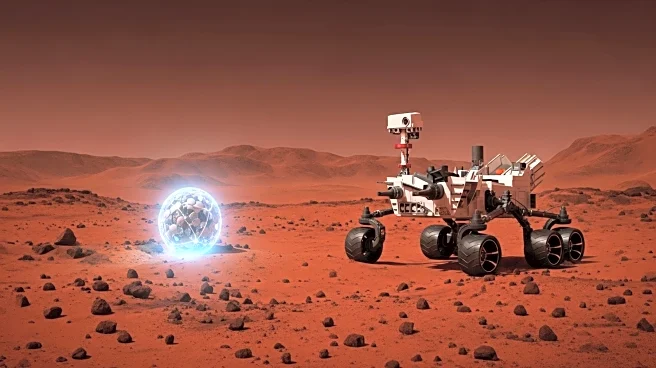What's Happening?
NASA's Perseverance rover has identified a potential biosignature in the Jezero Crater on Mars, which may indicate ancient microbial life. The discovery was made in a sedimentary rock named Cheyava Falls, found in an ancient river delta. The rock features 'leopard spots'—light spots surrounded by darker rings—similar to formations on Earth. It contains hematite, vivianite, and greigite, minerals that on Earth can serve as energy sources for microbes. Additionally, clay sediments in the rock contain organic material, though its exact type is yet to be determined. The sample has been collected for future return to Earth. Oleg Abramov from the Planetary Science Institute noted that while this is the strongest evidence of potential microbial life on Mars, it is not definitive proof, warranting further investigation.
Why It's Important?
The discovery is significant as it represents the strongest candidate for a biosignature in Martian astrobiology history. Unlike previous findings, this discovery involves a combination of organics, minerals, and textures that typically indicate life on Earth. The absence of high temperatures or acidity in the area further supports the biological hypothesis. The finding has generated excitement within the scientific community and among the public, as it could extend the understanding of Mars's habitability. However, without laboratory analysis on Earth, the evidence remains inconclusive. The potential discovery of life on Mars could have profound implications for science, philosophy, and the understanding of life beyond Earth.
What's Next?
The sample collected by Perseverance is intended for the Mars Sample Return mission, which faces challenges due to cost overruns and delays. NASA is seeking private partnerships to support the mission, but it is under threat of budget cuts. The return of these samples to Earth is crucial for a comprehensive analysis to confirm the presence of life. Meanwhile, China is advancing its own Mars mission, potentially overtaking the U.S. in this scientific endeavor. The scientific community remains cautious, emphasizing the need for patience and thorough analysis to reach definitive conclusions.
Beyond the Headlines
The discovery highlights the broader search for life beyond Earth, including efforts to detect biosignatures on Venus and exoplanets. The potential biosignature on Mars is more convincing than previous claims, such as the phosphine detection on Venus or dimethyl sulfide on exoplanet K2-18b. The Mars Sample Return mission's success is critical for advancing the understanding of Martian habitability and could influence future space exploration policies and international collaborations.









